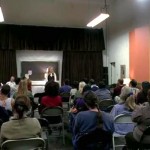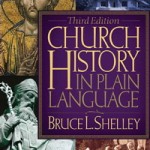More Families acting like Churches
A couple of weeks ago, I “replayed” an older post called “If the family were a church.” In that post, I wondered what it would look like if families acted like churches, especially when it comes to leadership, growth, and organization.
Now, someone else has taken up the gauntlet and has written another “episode.”
Over at “New Covenant Bible Fellowship of Las Vegas,” someone wrote a post called “Membership in the Family of God,” continuing the theme from my post above.
In this post, the author tackles the question of “membership.” How does one become a “member” of a family? Through membership classes, of course:
Then the father announced the dates for the new family membership class and all the recent “new” family members were expected to participate. The father said they must be taught all about being a member of our family, the do’s and don’t’s, the responsibilities, and all the good works they could do to show they were members in good standing in the family. If they did not graduate from the class, they would not become full-fledged members of the family, would not be able to vote at family meetings, and would not be able to teach any other family members anything…
You should read the remainder of the quote. It’s a good tongue-in-cheek sarcastic approach to looking at how the church acts today… not much like a family.
Share with those who want to know more?
Felicity at “Simply Church” has shared an interview that she did with John King in her post “How do you invite people to something that is Bible based?”
While the entire post is well-worth reading, the first question and answer is the one that resonates and helps me the most right now.
Felicity asks: “Give me some examples of simple ways to invite other people–especially those who are not-yet-believers–to join in a Discovery Bible Study.”
And, here is part of John’s answer:
Too many believers attempt to ram the Word down the throat of not-yet-believers and wonder why they don’t appreciate it. We need to use discretion. When an interest is shown, then give them a brief summary statement about God’s character or about a blessing that he recently gave. Keeping this short is critical because they may only be curious, not open, yet. The goal is to see if that truth or blessing resonates with this person. Then if the person wants to know/experience more, she/he will let you know. Spend the bulk of your time looking for those who God is preparing to hear the gospel. These are the people who will be blessed by a Discovery Bible Study.
For the most part, churches today are designed to spread the same teaching to a large number of people. This may be good from time to time, but it is not effective for the most part.
Instead, we must meet people where they are. Who should we share the gospel with? Everyone? Sure, but especially those who are interested in hearing more. (Read through the book of Acts and notice how many times this happens.)
What do you think? Do we constantly and continually share the gospel with everyone, or do we focus on those who are interested? If it is both, then how do we share differently with the different groups (i.e., everyone and those interested)?
I love good questions, and these are excellent questions for the church to consider!
It’s true. I love good questions. I even love to answer questions with questions. I’m not opposed to telling someone that I don’t know the answer to a question, then asking them another question to help us both work toward an answer.
So, I’ve been very pleased with Miguel at “God-Directed Deviations” lately. I’ve already linked to and commented on several of his posts. This post will not focus on one of his posts in particular. Instead, I want to point out the great questions that he’s asking.
(By the way, for those who do not know, Miguel is living in the cloud forest region of the Andes Mountains in Ecuador proclaiming the gospel and discipling people. He truly has a heart for helping people grow in maturity in Jesus Christ.)
Here are some of the excellent questions that he’s been asking on his site recently:
- How Important are Instruction and Imitation in Making Disciples?
- When is a disciple considered as “made”?
- When is a church considered planted?
- Is salvation a matter of urgency?
Like I said, I love these kinds of questions. They really force me to think about what I believe and how I’m living (or not living) in response to those stated beliefs.
If you want to reply to any of Miguel’s questions, jump over to his site and comment.
Have you heard any good questions that the church should think about?
In many ways, the church will look and act differently in different contexts
Continuing a discussion that Swanny started last week, Arthur at “The Voice of One Crying Out in Surburia” has written a very good post called “Why Trumps How.”
As usual, Arthur adds a great deal of wisdom and personal insight to this discussion. I particularly appreciate the way he brings his own journey into the topic. He recognizes that he started his search for understanding “church” by heading in a certain direction. Since then, God has changed his course slightly.
Here is part of what Arthur says:
If I am honest, I need to say that when I first started down this path, I assumed that a “house church” was, if not a silver bullet, at least a step in the right direction. I am not looking for a house church model or organic church model even though I think that comparatively it is far more conducive for an environment of mutual edification. I am also not looking for a “Reformed” church even though I am largely in agreement with the tenets of Reformed theology nor am I looking for an “Anabaptist church” although I see much that I admire in the Anabaptist tradition. I am looking for God’s church, His people living in community with one another. That means that I am looking for community among God’s people where His people are in an environment of mutual edification, loving support, rebuke and discipline where needed and a sharing of lives that goes beyond Sunday meetings whatever the form. It also means that it will look different in different contexts.
Arthur’s statement above – as well as other statements in his post that I did not quote – shows the difficulty of working within church models. Unless the model itself is flexible enough to change itself (which would then lead to a different model?), then it will necessarily hinder the growth and maturity of the church. (Think about how a mold shapes a cookie.)
Jesus shapes his church organization and gathering through his people, not the other way around. When the people are different, then in many ways the church should look and act differently as well. Will there be some similarities? Sure. But even these similarities can look differently from the outside.
Whether you agree with me on this point or not, I have a question: Why do you think “church models” are so attractive to people?
Time for a Religious Anonymous meeting?
Jason at “Bartender of Grace” has written an excellent post called “Religion Rehab, Part 1.” This is Part 1 because, you guessed it, there’s a Part 2 on the way, according to Jason.
In his post, Jason suggests several ways to help people move away from a life of religion and toward life in Jesus Christ. Like any good rehab program, he has included 12 steps, although he only writes about the first 6 steps in this post.
Here are the first 6 steps of his 12 step program:
- See Jesus for Who He Is
- Learn Humility
- Seeing Through New Eyes
- Submit to the Process
- Resist the Temptation to Become a Sacred Superstar
- Know the Difference Between Your Desire and God’s Will
If you’re interested, Jason describes each of these steps in detail, and I’m sure he’ll do the same for steps 7-12 in Part 2 of this series.
However, I’m not as interested in the steps per se. Instead, I was glad to see Jason include himself among the “religious”:
Most followers of Jesus have been contaminated by religion’s influence in one way or another. I certainly have.
Yes, we have all been “contaminated” by religion, and in certain ways we continue to be contaminated by religion, trying to reach God by the rules or processes that we keep.
To me, the importance of a post like this is not in the specific steps, although those are good. Instead, this kind of post is important because it reminds us that WE are guilty of religion. This is not just a problem with THEM (whoever is not like US).
We should be constantly and consistently testing our lives, our attitudes, our trusts, our plans, everything, to find that roots of religion that can cause problems. I know that I’ve found many in my life, sometimes in places where I least expected it.
What do you think? Can you be “religious”?
Serving a second helping of dinner to the church
I often write about eating together as the church. I think that sharing meals is incredibly important for the church. In Scripture, one of the most common activities among followers of Jesus Christ is eating together.
I want to point out a post and a Facebook comment that help round out the importance of sharing food (breaking bread) together as the family of God.
First, Felicity at “Simply Church” asks, “Why is food important when it comes to church planting?”
I’m going to combine one of her earlier paragraphs with one of her later paragraphs for this quote:
Food is very important in the context of seeing multiplying churches. Luke 10 is our signature passage on how to reach out to those who don’t yet know the Lord. It tells us that we are to look for people of peace–those who have influence and are open to our message. We can identify them because they offer us hospitality…
If you reject food, you are doing far more than saying you don’t want to eat. You are rejecting friendship. There have been times when I would have preferred to refuse food. (You try eating a hamburger you have just watched a cockroach walk over!) If you want to see disciples made in the harvest, swallow your squeamishness and eat what is set before you!
Also, on Facebook, I recently posted a link to an older but related post that I wrote called “Church and Meals.” My friend Ron left this comment in response:
I think we need to be very careful not to equate eating together as fellowship. While meals can open the door for fellowship, it does not necessarily mean fellowship. It can be a means, but it is not an end. Often in sharing meals together people sit with the same people, have the same conversations, same people doing the dishes and cleaning up, and leave the same people eating by themselves. Seeing the early church eating together was their way of providing fellowship. Simply copying the `program`does not make a church more a community or not. Even in the meals, there must be intentionality.
Both Felicity and Ron make good points about meals. Meals are an excellent (and I would say necessary) aspect of church life because of the possibility of fellowship. Of course, we must be intentional about that fellowship. We can share a bowl of soup and only talk about the weather and the latest sporting event.
Of course, if we don’t share meals, then even the possibility of fellowship is drastically reduced…
(By the way, the thumbnail for this post shows the chicken vegetable soup that we shared with the church last weekend. We also ate “second helpings” of some wonderful food that others shared with us. And, then, there was the fellowship… learning more and more about our brothers and sisters in Christ…)
Look at that body: The danger of “models” for the church
Swanny at “Allergic to BS” has written a great post called “I’m Not a Model… You Know What I Mean?”
(By the way, hopefully you get the song references in Swanny’s title, which led me to another song connection in my title…)
In his post, Swanny talks about “models” of church organization and gatherings. He’s not for them… not at all.
He writes:
I want to step out there and say to everyone that reads my blogs and emails and talks to me on the street. I am not looking for or asking anyone to come up with another ”church model”. I am so sick and tired of people obsessing with how something is supposed to work. I would like for people to focus more on “why” they are doing what they are doing, and is what they are actually doing make sense. Ask yourself what you are really doing, and then answer yourself…honestly. If I said to someone I attended a ”house church”, the first thing they will ask is.. “well, how does that work?”
Later, he continues:
There is a huge problem going on out there in “ChristianLand”. I do not think the church is in need of anymore models or systems, but rather it is in a desperate need of a ginormous VISION of who Jesus Christ really is. Just live life together as His Body in community. I see a church with no models, I see church as a bunch of people gathering or assembling together to BE Christ’s actual body, by having Him work through us so others can see and experience the “Allness” of God”, which is simply love, not a human-made model of love
In this last paragraph, Swanny hits on the real danger of models. Yes, organizing a certain way or meeting together in a certain way may have worked for a certain group of believers in a certain place at a certain time. But, that does not mean that the same “model” should be lived out by any other group of believers.
Why? Because the church is people – God’s people gathered together. And, unless you haven’t noticed, people are different. They are gifted differently; they have different concerns and issues; they have different strengths and weaknesses; they have different opportunities and passions. When we force people to organize or gather in a way that another group organizes or gathers, we are inherently forcing them into a pattern (a “model”) that DOES NOT FIT.
Will there be consistent aspects of any group of believers gathering together. Yes, because if they are following Jesus Christ, he is their head, and he will be the focus.
Otherwise, though, models are dangerous and disruptive to the maturity of the church.
But, it’s not Thanksgiving anymore
So, the turkey has been eaten. The leftovers are stacked in the fridge. The relatives have returned to their homes. And thoughts have turned to Black Friday savings.
Thanksgiving is over; Christmas (shopping) is here.
I was thinking about this yesterday when I read the following on Dave Black’s blog (Thanksgiving, Thursday, November 24, 2011 at 8:26 a.m.):
“So, what will be our Thanksgiving verse today, honey?” Becky asked me as we sipped coffee this morning in front of a warm fireplace. The verse that came to mind was, of course, 1 Thess. 5:18: “In everything give thanks.” We both agreed that we should give thanks “in” everything but not necessarily “for” everything. After all, that’s what we have been taught all our lives. Then I remembered. “There’s a verse somewhere,” I muttered, “that says we are to give thanks for everything.” Indeed, there it was — Ephesians 5:20: “Giving thanks always for all things in the name of our Lord Jesus Christ to God our Father.” Sure enough, the Greek preposition was huper, “for.” The takeaways from this verse struck us immediately:
- Thankfulness is to be the consistent attitude of our lives; we are to give thanks “at all times” (pantote).
- Thanksgiving must be more than an attitude, however; it must be expressed.
- We must learn to give thanks not only “in” every circumstance of life but also “for” every circumstance of life.
- A thankful spirit is possible because our gratitude is based on the name (character) of the Lord Jesus. Because He is our Master (He is in control of everything that happens in our lives), for us to be grumpy and gripy is like slapping Him in the face.
- Thanksgiving is directed toward God our Father — our Creator God (who is sovereign over all His creation) and our Father God (who is our Abba, tenderly loving us more than any earthly father ever could).
And, all of this made me wonder… if we are not thankful today, were we actually thankful yesterday?
Each one should be fully convinced (of my position) in his own mind
My friend Eric at “A Pilgrim’s Progress” has started a new series on Romans chapter 14. So far, he’s written the first post (“The Issue“) in what he has promised as a four part series. The parts in the series will be 1) the issue, 2) the context, 3) what Paul says and doesn’t say, and 4) the application.
In describing “the issue” related to Romans 14 (and I’ve suggested that he looks at Romans 14:1-15:13), Eric writes:
Two issues we must deal with related to Romans 14 are how to correctly understand it and how to accurately apply it. Specifically as it relates to church practices, I’ve heard Romans 14 used again and again to support various traditions, programs, activities, etc. that have little to no scriptural support. The argument goes something like this, “I’m convinced in my mind that what we are doing (whatever it is) honors God. Romans 14 tells others not to judge us. Therefore, we are going to continue to do it.” Romans 14 is often used as a sort of “trump card” to end discussions about church issues. When some Christians are unable to provide biblical evidence for why they do what they do, they pull out Romans 14 to both win and end the discussion.
I think this definitely an issue related to this passage and other related passages such as 1 Corinthians 8-10. Just how far do we go in allowing that “Each one should be fully convinced in his own mind”?
I also enjoyed that Eric left this first post open. I’ve already left a few comments interacting with Eric, and perhaps you would want to also.
So, I’m looking forward to Eric’s series.
There is no golden age of Christianity
Christoper at “A New Testament Student” is preparing for his first seminary course, Survey of Church History, by reading one of the required books. He wrote about his response to the book in a post called “History.”
The book that he read is a very good book on church history called Church History in Plain Language by Bruce L. Shelley. If you haven’t read it, you should.
Here’s the first “realization” that Christopher came to after reading this book:
First, There is no golden age of Christianity. Each age holds its own flaws, and each leader his or her own failings. The patriarchs, the Roman Catholics, the reformers, the emperors, even the apostles struggled in their understanding of God, and how we relate to Him. As a Christian growing up in the evangelical tradition, I have heard a great deal of praise attributed to the apostles and reformers contrasted by sharp criticism, if not hatred, for all things Roman Catholic. While I am a protestant, reading this text has opened my eyes up to an important truth. The Gospel did not pass away between the fourth and sixteenth centuries only to be resurrected by the Reformation. The name of Christ remained a focal point for a millenium in the midst of plagues, persecutions, and political strife, and the Catholic practice of monasticism preserved all of the ancient writings, including the Scriptures, that brought the reformers to their powerful conclusions. There may have been many distorted and overlooked truths, but there were men who stood firm in their trust of Christ and worshipped Him in the way their culture taught them was appropriate.
Much of the New Testament was written to correct problems that had already cropped up among those early churches. As early as Acts 5 and Acts 6, we see problems in the church. So, Christopher is right… there is no golden age. Of course, if there were no problems among the churches, we may not know as much about them as we do today.
Think of it this way… because of the problems and struggles and issues in the early church, we know how we should respond and live today.
What do you think? Was there a golden age of Christianity?










